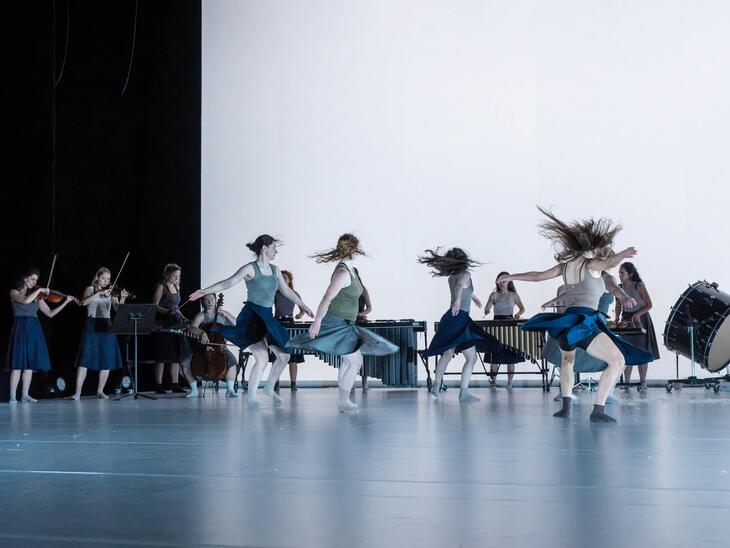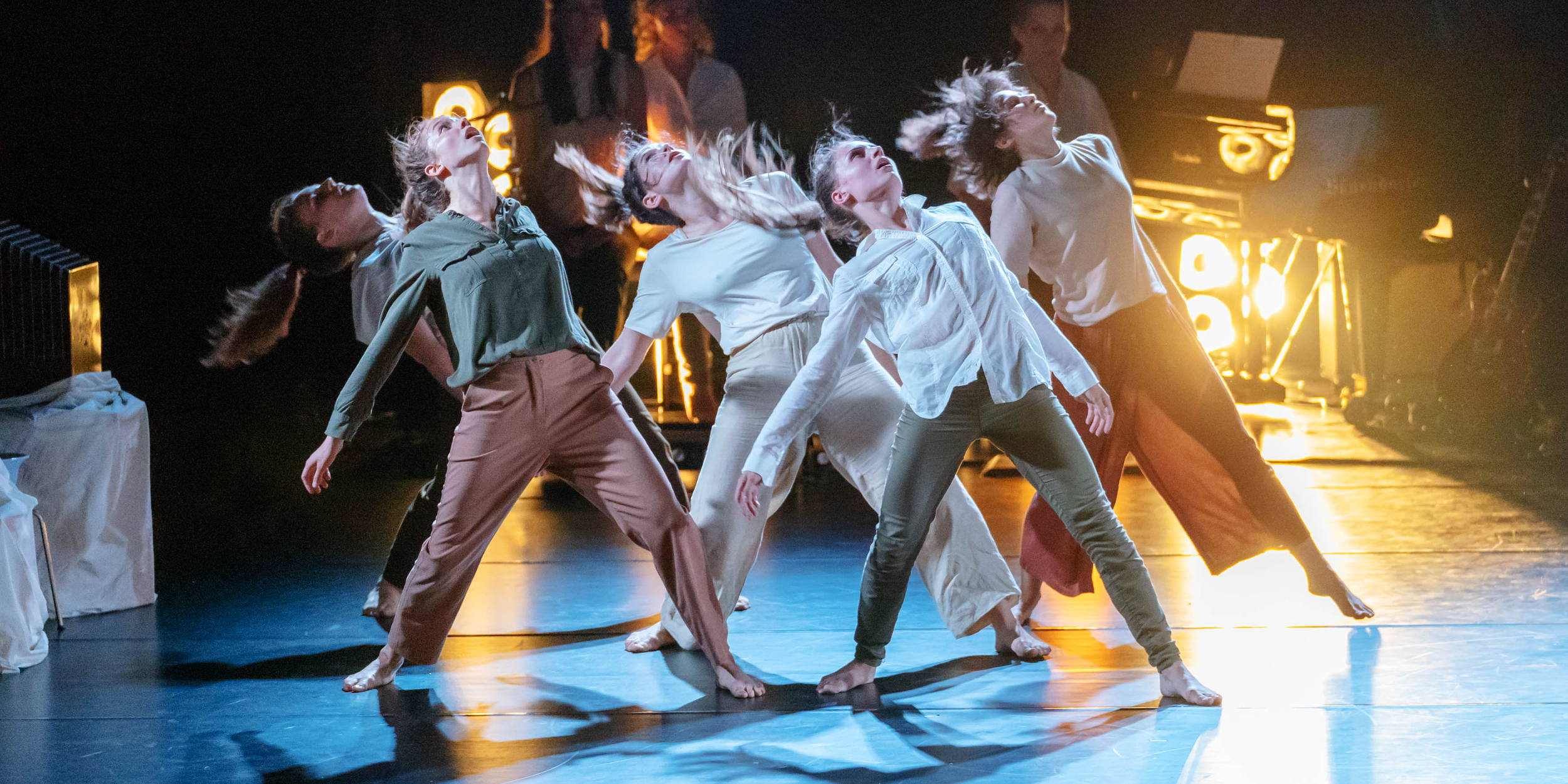
Save the date: The International Summer Course is in preparation and will take place in Salzburg from July 6-12, 2025.
+++ Registration for the entrance examination for pedagogical programmes and Pre-College still possible until 28th March 2025 - all further information on the course pages! +++

The master's programme in Elemental Music and Dance Education enables students to deepen their pedagogical, artistic and academic skills. Competencies in academic and artistic research are developed and are applied in a final thesis. Students expand their musical, dance and speech skills in performative and didactic contexts, particularly in the field of community music and community dance.
Department of Studies & Examinations
+43 676 88122 492
studienabteilung@moz.ac.at
Length of course
4 semesters / 120 ECTS-AP
Language
German
Downloads
One of the defining characteristics of community music and community dance is that it link creative expression through music and dance with participation and social and cultural involvement. The study programme is oriented towards the current state of development in the arts as well as the state of research in the academic disciplines involved. Specialisation in artistry and performance or in academia and pedagogy is possible within this master's programme.
In addition to those professional and occupational fields in which students are qualified following undergraduate studies in Elemental Music and Dance Pedagogy, the following further areas are open to holders of a master's degree in this subject:
The aim of the study programme is to go beyond the bachelor's degree and to deepen the subject-specific, artistic, theoretical and didactic knowledge in the field of elemental music and dance education. Subject-specific and interdisciplinary topics are dealt with in a variety of artistic and academic formats, with all participants appreciating how interdisciplinary cooperation can be enriching for all involved. As part of this process, students experience diverse encounters with a contemporary, innovative and future-oriented artistic and pedagogical practice.
The research-based approaches introduced to students ensure that their future work is based upon reflected pedagogical practice in their area of artistic expertise as well as being underscored by sound theoretical knowledge. Students will choose either a performance artistic or a pedagogical and scholarly specialism, which informs their development of independent artistic projects and research questions respectively. During the course of their studies, students will build an individual academic profile by developing and diversifying their Individual competences. Particular emphasis is placed on further expansion and professionalisation in the following fields:
This four-semester course of study is modular in structure. Each module comprises teaching and learning content that has been combined to form thematically and didactically meaningful units of study. The names and content descriptions (study objectives) of the individual modules, the number of ECTS credits to be achieved for each module, and the type of performance assessment are specified in the curriculum. The module descriptions refer to the corresponding learning outcomes and competencies.
Bachelor's program is a face-to-face program and cannot be offered - not even in part - as a distance learning program. The courses from the Main Artistic Study, as well as in other One-to-One Tuition, are designed to build upon each other. Prerequisite for enrolment in courses from the Main Artistic Study or One-to-One Tutition is a positive evaluation of the previous semester (from the second semester onwards). The same applies to the subject Musical Coaching. Musical Coaching can only be taken in combination with the Main Artistic Study.
Students of the Master's programme are encouraged to complete a semester abroad. Semesters 2 and 3 of the degree programme are particularly suitable for this. In addition to subject-specific competences, a study period abroad can also lead to the acquisition and deepening of:
Examinations and assessments taken during studies abroad can be approved by the Director of Studies as equivalents to compulsory subjects, elective subjects or free elective subjects required by the Mozarteum University for your degree course. The documents required for the approval procedure are to be submitted by the applicant immediately after their exchange semester.
To obtain their master's degree, students must fulfil the following criteria:
To obtain their Master’s degree qualification, students will undergo the following assessments:
Admission to an MA Performance programme requires the completion of a relevant bachelor's degree (BA) or other equivalent degree at a recognised domestic or foreign post-secondary educational institution (e.g. university, college) (§ 64 Para. 3 UG 2002).
A prerequisite for admission to this university course is also the successful completion of an audition. Registration for an audition is completed online via Muvac and requires candidates to upload documents proving their eligibility for the course. An invitation to audition will only be issued after the necessary documents have been submitted in full and approved by the admissions office.
PLEASE NOTE:
Applicants whose documents have been approved will be invited to the on-site audition. This consists of an instrumental audition and, if necessary, a test of German language skills.
Documents required for online application
Form of the documents
Within the entrance examination, the following partial examinations must be passed:
A - Artistic audition (Music and Dance)
Requirements (music): Two moderately advanced pieces of different periods and characters must be performed (instrument or voice). The total performing time should be 5-10 minutes. The candidate will also be provided with an improvisation task by the examination panel, for which they will be given approx. 10min time to prepare before presenting their improvisation. This is followed by a short reflection on the artistic presentation, before the candidate is invited to give an oral statement about how they intend to shape their master's degree (e.g. setting a focus, project ideas) with regard to their musical studies and in the pedagogical and transdisciplinary context.
Requirements (dance): Participation in a dance technique class (contemporary), assessement in the group under the guidance of a teacher. Some elements of the assessment include: Guided warm up, realisation of movement material in a fixed position and moving through the room, rhythmic exercises, contact and spatial orientation exercises, variation and interpretation of movement material and improvisation. (Duration approx. 45-60 minutes.)
Performance of a prepared, individually designed movement/dance study on a topic of the candidate's choice, e.g. presentation of a movement-exploration or dance movement scene, with movement material to be chosen by the candidate. The study can be designed with or without music and/or include other elements supporting the performance (text, image, object, etc.). Duration: minimum 3 to maximum 5 minutes. This will be followed by a short interview with the examination panel, in which the candidate refelcts in their performance and the intention, process and sources of the movement material, its stylistic location will be discussed. The candidate should be prepared to perform a follow-up task if requested by the panel. The examination will conclude with the candidate giving an oral statement about how they intend to shape their master's degree (e.g. setting a focus, project ideas) with regard to their dance studies and in the pedagogical and transdisciplinary context.
B - Academic entrance examination
Upon arrival at the examination, candidates will be provided with selected text excerpts on theory formation in elemental music and dance education as well as related fields. Based on this, they should develop ideas for a possible research project (questions, theoretical contextualisation, relevance for EMTP), present them in writing and explain them orally (e.g. in the context of a discussion) (approx. 10-15 minutes).
C - Demonstration of pedagogical aptitude
Interdisciplinary teaching practice in the form of a teaching demonstration (approx. 15 minutes) followed by a reflection and discussion (approx. 10-15 minutes). Based on an impulse material (e.g. text) provided upon arrival at the examination, candidates are to design an interdisciplinary process (focus on music, dance, language) ad hoc with a group (students or applicants) and outline a plan for a further teaching unit.
D - German language skills
After passing Partial Examination A, candidates will be admitted to Partial Examinations B-D (possibly in a different order). The repetition of the sub-examinations A-C in case of failure is not permitted. The admission examination can only be repeated in its entirety and only in the next academic year. The admission examination can be repeated an unlimited number of times.
All parts of the entrance extamination will take place in the period 16.6.-18.6.2025.
Please note that the Mozarteum University Salzburg offers various support options at the time of your audition and during your studies if you have a disability or a chronic illness.
If this applies to you and you would like to take advantage of counselling, please contact Claudia Haitzmann: claudia.haitzmann@moz.ac.at or +43 676 88122 337.
You can find more information about starting your studies here: